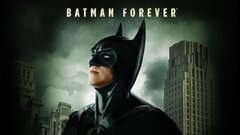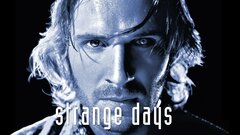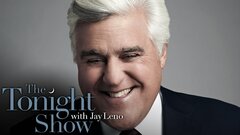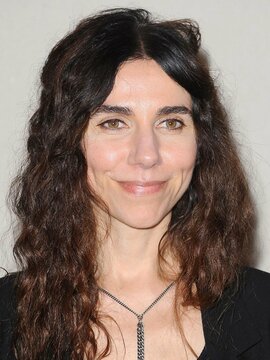An acclaimed performer in alternative rock circles for over two decades, P.J. Harvey delivered intense, sonically bruising mediations on sex, love and desire over the course of a storied career that brought her two Mercury Prizes and the admiration of millions of fans. Brought up on a diet of the blues, Harvey brought the genre's brawn and bravado to her early work, including such hit records as Dry (1991) and Rid of Me. She soon shifted away from blues-rock for a more complex mix of rock and electronica with To Bring You My Love (1995), and would frequently change musical direction over the next five albums and 15 years. Harvey moved freely from electronica to straight-ahead rock and then to a curious blend of piano and autoharp on 2009's White Chalk before blending all of these sounds for her 2011 album, Let England Shake. Arguably the most critically praised record of her career, it made her the only artist to receive two Mercury Prizes, and cemented her status as one of rock's most inventive and eclectic figures.
Born in Bridport, a market town in the English county of Dorset, on Oct. 9, 1969, Polly Jean Harvey was raised on her family's sheep farm in the town of Corscombe. There, her parents, stonemason Ray Harvey and his wife, sculptor Eva Harvey, introduced her to a wide variety of music, including blues, Bob Dylan and psychedelic provocateur Captain Beefheart. Harvey also learned to play guitar and saxophone, which she soon applied to an array of bands, including the folk trio The Polekats. Though music was her primary passion, Harvey was also fascinated by sculpture, so eventually attended Yeovil College in Somerset to study art foundation. While there, she joined the Bristol-based group Automatic Dlamini, a band fronted by the experimental-minded, multi-instrumentalist John Parish. Harvey provided saxophone, guitar and backing vocals for the group, which performed extensively throughout Europe and recorded two albums. Parish would have an enormous influence on Harvey's subsequent career, most notably on her ability to perform for and interact with a live audience. After Harvey departed Dlamini in 1991 to form her own group, Parish would remain a consistent musical collaborator, producing and performing on the majority of her recorded efforts.
In 1991, while studying sculpture at Central Saint Martins College of Art & Design in London, Harvey formed the trio PJ Harvey, with fellow Automatic Dlamini alums Rob Ellis on drums and Ian Olliver on bass, who was soon replaced by Steve Vaughn. The group's demo recordings caught the attention of London-based indie label, Too Pure, which released the single "Dress" to considerable acclaim from the British press. Unwavering support from influential U.K. DJ John Peel, among others, helped to build a groundswell of anticipation for the band's debut album, Dry, which generated overwhelmingly positive response on both sides of the Atlantic. The record's second single, "Sheela-Na-Gig," established the PJ Harvey sound: a stripped-down punk-blues hybrid fueled by the raw power of Harvey's voice and guitar. Though a reluctant interviewee, Harvey generated considerable attention for the record through a canny series of photo layouts that featured her in starkly sexualized poses.
Dry was among the most acclaimed alternative rock albums of 1992, with no less of a cultural icon than Kurt Cobain citing it as one of his favorite records. PJ Harvey toured extensively throughout the year, culminating in an appearance at the UK's Reading Festival that cemented their star status. However, the relentless performance schedule and press commitments took its toll on Harvey, who suffered a near nervous breakdown upon completion of the tour. But she soon recovered to complete work on the group's second album, Rid of Me (1993), which marked the beginning of their new contract with Island Records. Produced by legendary musician-provocateur Steve Albini, who had produced albums by Nirvana, the Pixies and the Breeders, Rid of Me turned up the volume and the emotion on Harvey's songs, which addressed themes of sexual longing, righteous anger and gender issues in bursts of powerful guitar squalls and howling vocals. The record was an unquestionable smash around the world, boosting Harvey from cult favorite to genuine rock star. By 1993, PJ Harvey was opening for one of the biggest bands in the world - U2 - but again, external pressures weighed heavily on its individual members. By the end of the tour, the band had broken up.
Now a solo artist, Harvey reunited with John Parish and an eclectic group of collaborators, including producer Flood (U2) and multi-instrumentalist Mick Harvey of the Bad Seeds to record her third record, To Bring You My Love (1995). Though similar in terms of song content, the album showed Harvey's growing interest in other musical elements, including touches of electronica and lush orchestration. Her stage persona also went through a transformation, which saw the diminutive Harvey trade her previous masculine stage attire of boots and t-shirts for gowns and vampish wear. Press attention for the new release was again intense, but the album performed only moderately well, reaching No. 40 on the U.S. charts. Harvey would spend much of 1995 touring to support the record before retreating from the spotlight for most of 1996 and 1997. During this period, she recorded a song with Bad Seeds frontman Nick Cave, with whom she had a tumultuous romantic relationship, and a collaborative album with Parish called Dance Hall at Louse Point (1997). That year, she reunited with Rob Ellis for a new record that leaned more heavily on electronic elements than her previous work. The resulting album, Is This Desire? (1998), received mixed reviews but earned her a Grammy nomination for Best Alternative Music Performance.
A six-month stay in New York City was the inspiration for Harvey's fifth studio album, Stories from the City, Stories from the Sea (2000), which delivered a valentine to her adopted home in more aggressive, traditional rock sounds. The record, which featured collaborations with Radiohead's Thom Yorke on three songs, was both a critical and commercial success, selling over one million copies. More significantly, it generated two Grammy nominations, as well as the prestigious Mercury Prize. However, her receipt of the honor was completely overshadowed by the tragic events of Sept. 11, 2001, which also happened to be the day of the awards ceremony.
Harvey spent the next two years recording new material while contributing to a variety of musical projects by like-minded friends, including Parish, Giant Sand, and the Queens of the Stone Age side effort, The Desert Sessions. In 2004, she released Uh Huh Her, which she produced and which featured her on every instrument, save the drums. Reviews were again somewhat mixed, but the subsequent tour included stops at the Glastonbury Festival and opening spots for alternative legend Morrissey. The 2007 release White Chalk marked the beginning of a new phase in Harvey's musicianship. Gone were the stark guitars and plaintive wails, and in their place were piano-driven ballads that harkened back to Victorian-era music. Critical response to the record, which Harvey herself described as "really weird," was favorable, and the subsequent tour featured Harvey in solo performance with piano and autoharp. She followed this album with a second joint effort with Parish called A Woman a Man Walked By (2009), which reached No. 25 on the U.K. Modern Albums chart. The year also marked her debut as a theatrical composer with her incidental score for a Broadway production of Ibsen's "Hedda Gabler."
Though a passionate performer and songwriter, Harvey never showed much interest in political matters until the release of Let England Shake (2011), her eighth studio album. The record's focus was England's historical involvement in war, from the distant past to their involvement in the second Gulf War. The sheer urgency of the recordings earned Harvey some of the strongest positive reviews of her career, but more importantly, a second Mercury Prize, which made her the only artist to receive the award twice in their career. The award boosted sales of the record dramatically in England and abroad, where it achieved gold sales status. That same year, she returned to theatrical composition with the score for the Young Vic Theatre's production of "Hamlet," which included original songs written for the main characters.
By Paul Gaita




































